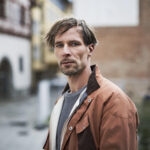Überlingen, also known as the ‘Nice of the Swabian Sea’ at the border to Switzerland is a popular, growing idyll of prosperity in southern Germany: People work, live and enjoy life next to leading defense industries, lovely combined within medieval flair, dolce vita with clean front gardens and increasing rental costs. In 2021, an association was founded with the title ‘Überlinger Kulturschutzgebiet e.V.’, an association called „culture protected area Überlingen“. We speak to one of its board members, Michael Roggon, a practising artist, active curator and musician, who has lived in Überlingen again for several years after studying in Berlin. Can commoning practices add relevant cultural needs and attractive spaces to the city?
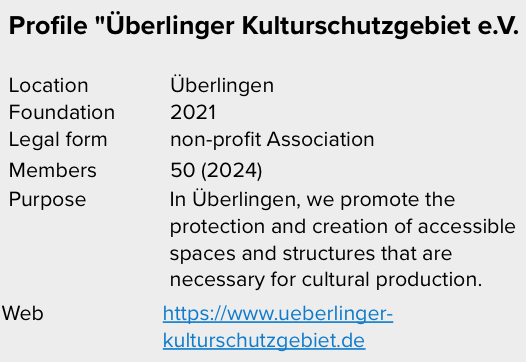
What is the basic idea behind the association „Überlinger Kulturschutzgebiet e.V.“?
Michael Roggon: We came together in Überlingen on Lake Constance because we wanted open spaces, structures and a network with shared resources. In order to build something like this, you need a motivated community that didn’t exist in Überlingen before.
In Überlingen, the public space is strongly structured by property and tourism interests. Here it is traditional, beautiful, clean, well-kept, finished, exclusive and sometimes hermetic. We have lived in cities where our generation and our milieu shape space. Many aspects of what we perceive as lively and inspiring hardly find a place in Überlingen. Young, unfinished, new, strange, experimental, peculiar, etc.
The available spaces have a church or traditional orientation. Municipal spaces are too expensive. This leaves our generation with only profit-orientated spaces, where high rents, target group profiling and sales strategies often overshadow anything warm, fun and sensual. We want spaces that make us want to do things together and share with each other.
The need for such spatial qualities, which continue in the quality of encounters, has brought us together. And we founded an association to get involved in Überlingen’s social and political life and to open up such spaces in Überlingen.
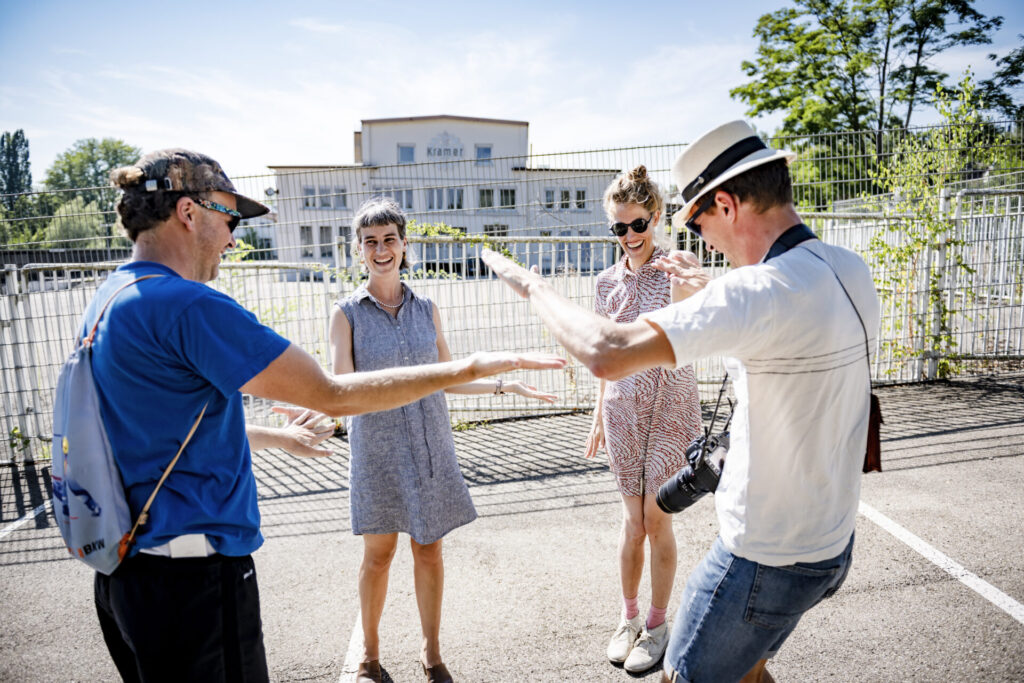
And what is the association’s response in the city of Überlingen?
Michael Roggon: We respond to spatial potential. When we founded the association, the development of a very well-located brownfield site the size of Überlingen’s old town was in the starting blocks. We were totally motivated by this neighbourhood development and a very suitable hall. We are also responding to the fact that artists have been leaving the city for decades due to rising rents. What would a city be like without artists? That’s what we’re trying to explain. Then we started with a very open question:
Who needs a place with low-threshold access today or in the future, or a working environment with shared resources and a neighbourhood of diverse small businesses? What offers and what demand are there in Überlingen? Who is involved?
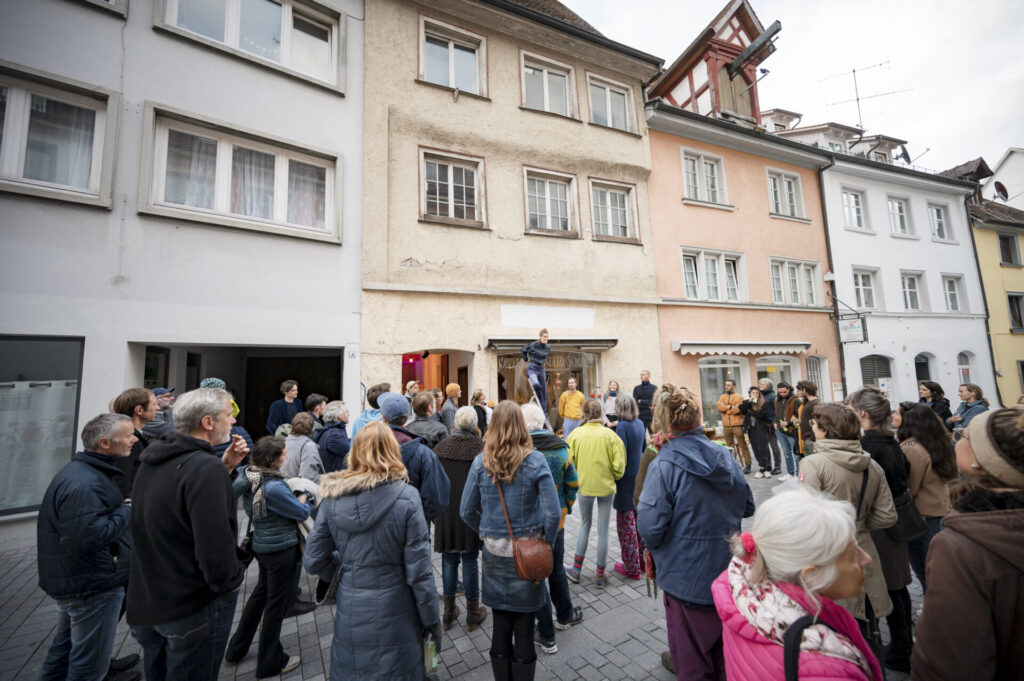
Who needs a new meeting place in Überlingen?
Michael Roggon: In order to question this in a sensual and approachable practice in urban society, we organised the event „Fleigender Teppich“ (flying carpet) )series in 2022. In 14 events, we got to know many places, many people and their work and managed to become a small movement beyond our initiative group.
This includes cultural practitioners from all sectors, individual entrepreneurs, company founders with a creative or social connection and sharing and public welfare initiatives. The majority of those involved have returned to Überlingen after years of teaching and travelling or have landed here for the first time. The youngest are still at school and the oldest are already retired.
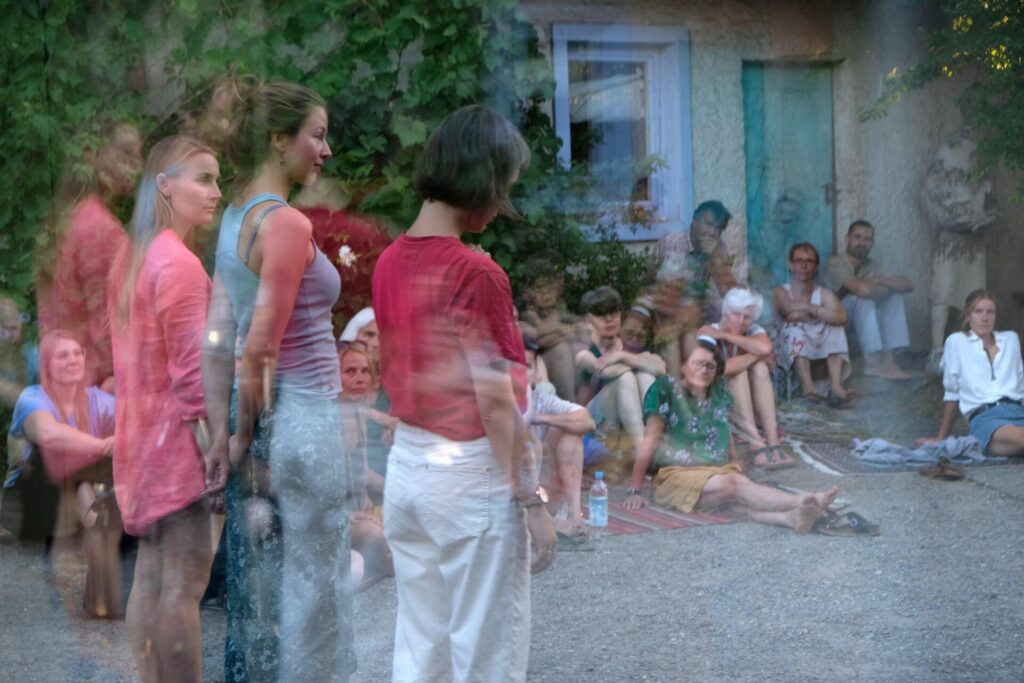
What is the added value for you and your organisation the community you talk about? And how does this connect with the projects you offer?
Michael Roggon: I get to know other interesting returnees and new arrivals in the city. They are looking for connections and there is little or no alternative in Überlingen.
I’m very happy about this emerging community: collaborations and discussions are emerging with artists from all fields, with people who are thinking about social forms and sustainability issues.
Our projects are based on a low-threshold and non-commercial practice, where you go in more as a personality, less as a professional, not as a business partner, where you are first on a first-name basis, where an encounter can arise.
In the „Tun & Teilen“ („Doing and Sharing“) 2023 project, we have created an experimental framework for us and interested people to practise and question this form of encounter in a focussed way. What happens when we move closer together? What do we want to and can we do together? What do we want to and can we share with each other?
In 2023, we gained access to a vacant private property in the centre of the old town. We have set up a participation lab there under the name OMEGA B. The „Tun & Teilen-project“ (doing and sharing) was the starting signal for the kind of encounters and dialogue we want to cultivate in this space.
Initially, we adapted the then still bare rooms of OMEGA B to our individual basic needs and spent the day together. There was no plan, no material and no theme for what we did together. However, we had stipulated that everyone could invite everyone else to a joint session on a topic or activity at any time. In the future, we would like to continue to use the session principle that was intensively developed here for community building, artistic practice and sensual encounters.
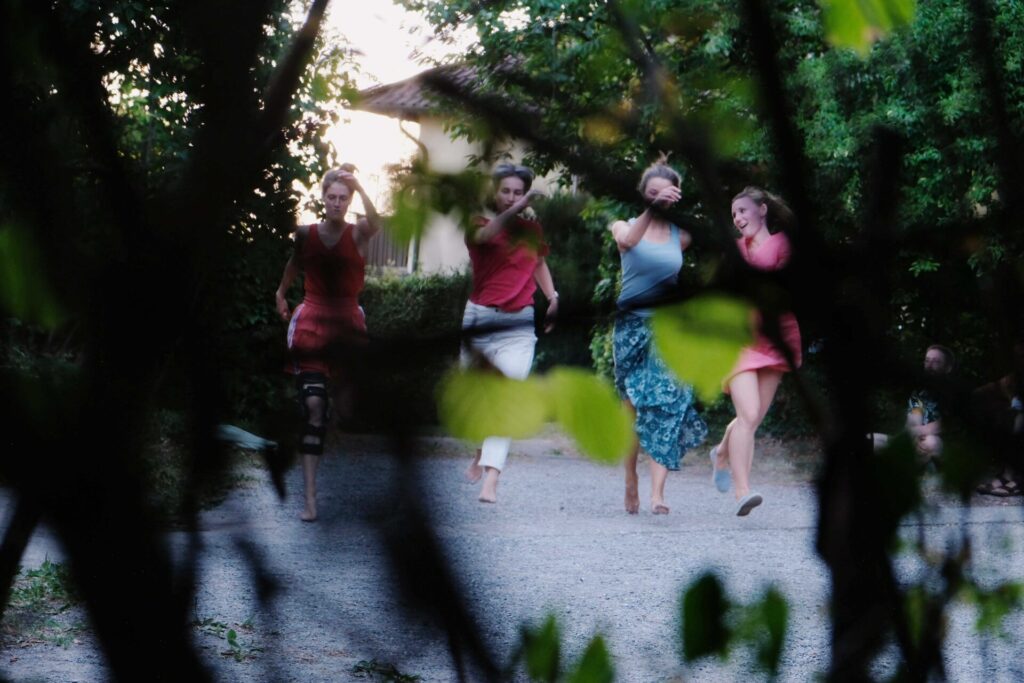
How do newcomers deal with this openness in your project programmes?
Michael Roggon: In fact, this openness and openness to results is exclusive for many people. Offers of participation can easily be overwhelming. Standing in a room where you are allowed to do something yourself, where there is an open appeal in the room, is really not everyone’s cup of tea. Seen in this light, of course, we don’t appeal to everyone. We work in an artistic practice that we want to communicate and multiply as a social practice in Überlingen.
We offer a new experience. We place ourselves in the centre with all our vulnerability and also in the face of prejudice and alienation and say ‘We do it this way, you are welcome to join us’. And people are often amazed. ‘Why do you do it like this?’ And more conventional, profit-orientated ways are suggested to us. We are told ‘that’s not possible’. The economic developer in Überlingen is still paying an agency that offers a similarly intended format to our Flying Carpet rather than addressing our experience and our network. Our Flying Carpet was much more popular than this community-organised Founders Walk. It runs like this: newcomers and young entrepreneurs are guided through the city for three quarters of an hour, the economic developer gives a monologue, the agency takes photos and at the end there is a pretzel in the town hall.
We would like to be asked for such events in the future. How did it work that everyone brought their own food?
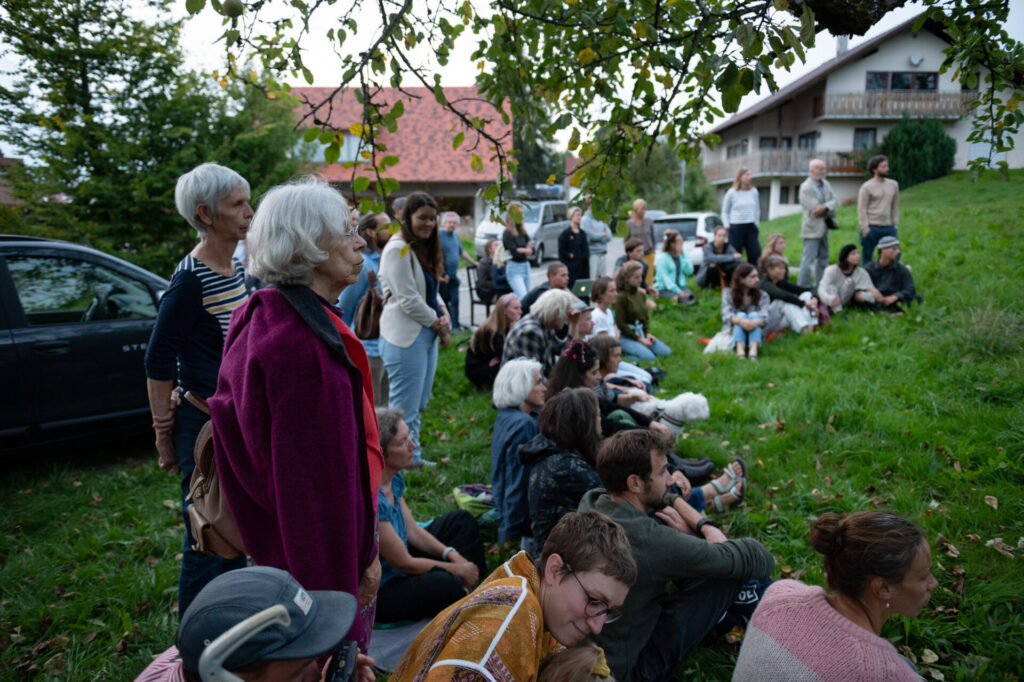
How did it work that pairs were formed between actors and performers who got to know each other to prepare the joint performance?
How did conversations between those present develop? Did they result in further connections and co-operations? Has a group been formed? We have not yet been asked any of these questions.
Michael Roggon: The political parties want to utilise vacancies and create low-threshold, accessible spaces. The fact that we are already creating both without a cent from the local authority has not yet led to us being approached as a cooperation partner. I suspect that it will still take a while for the trust to develop that we, as a young non-profit organisation, offer professional and pioneering services. There hasn’t been anything like that here yet.
What we do is still seen by many as strange or even threatening.
In a police report regarding an offence at one of our events, it actually said ‘the people present are from the left-wing spectrum’. Not everyone in provincial Überlingen is yet able to differentiate between bombers and cultural workers…
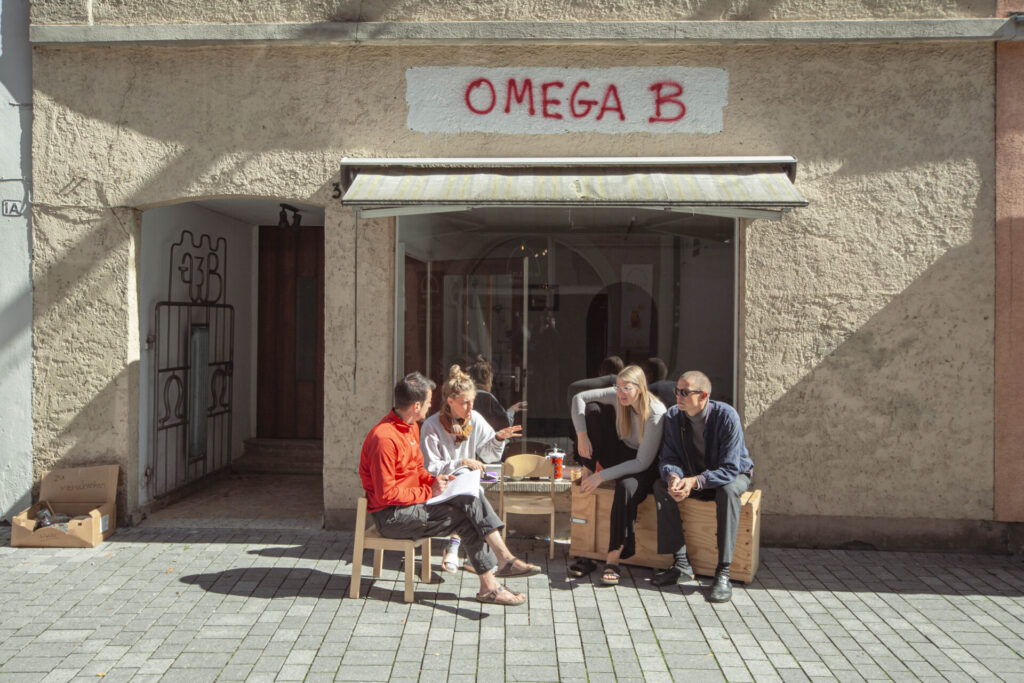
You have been operating an interim use for some time. A rental property. The building is not going anywhere. How does that fit in with this very flexible practice, which is also geared towards improvisation?
Michael Roggon: We have been running the OMEGA B centre as a laboratory for a cultural sanctuary in Überlingen for a year now. A low-threshold place for culture and encounters. The ground floor is intended for public use, the first floor for community use and the second floor for individual use. We have retained a certain spontaneity in our event organisation. The house is a hovel and we improvise functional structures for all kinds of events that invite themselves to us with the things we received from a large donation in kind from an underwear factory.
What has changed a lot is that even without visible events, we still have responsibilities. We have to pay rent, the building needs maintenance and renovation and the use of the building needs to be constantly organised. A lot of work.
We first made an open call to invite users. Nobody got in touch. Then, as the association’s board, we organised a few events to show what is possible in the rooms. Now that we’ve been doing this for a year, we’re getting more and more enquiries. In the meantime, some people have learnt that this is a low-threshold space that I can easily use.
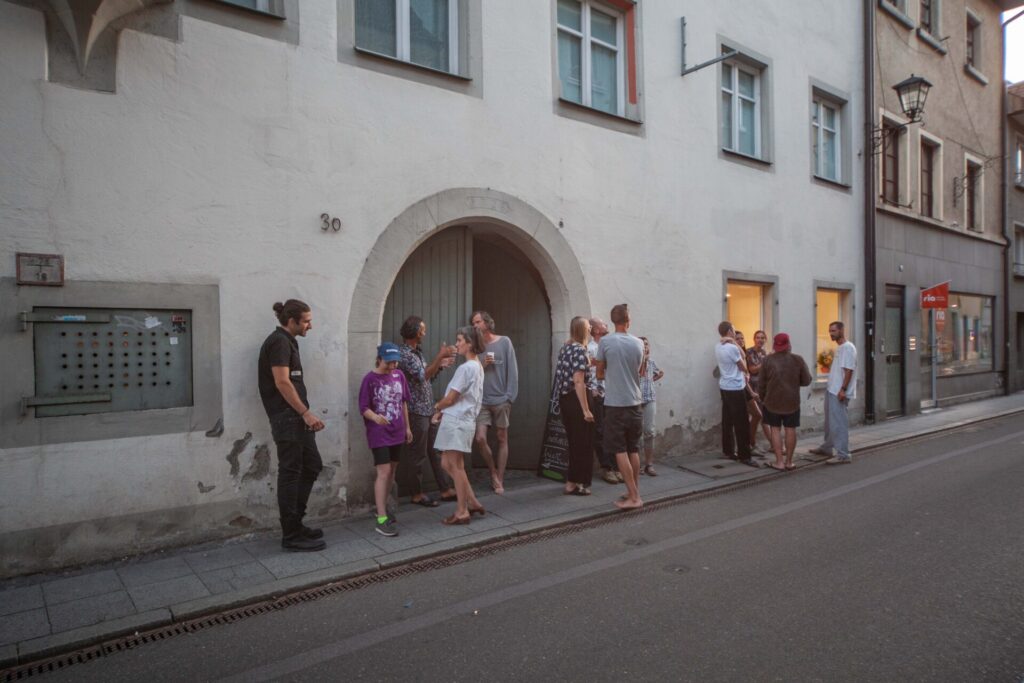
Who can use the rooms?
Michael Roggon: We invite cultural professionals and initiatives for the common good. The demand from cultural professionals is the greatest. Visual artists, performers and musicians regularly use the ground floor for events. Painting courses, dance workshops for people with assistance needs and temporary individual studio use took place on the first floor. We use the kitchen and living room as a meeting place for our teams. We accommodate guests in the bedroom. Travelling artists or touring bands. And in the meantime, we have hosted artists in residence there twice. The kitchen is a great place to cook for groups and events and set the table for 15 small people at our large round table. A low-threshold integration format is now based there. The Deutsch to go group comes to the multicultural lunch table.
A food sharing initiative would like to set up a distribution centre in OMEGA B. The rooms on the 2nd floor are used by visual artists. Thanks to the great support of the Zwischenzeitzentrale (ZZZ, Bremen), we can offer the rooms very cheaply and free of charge. We are using the building without a rental agreement as part of a transfer agreement drawn up by ZZZ. A contract that is harmless for the owners of vacant properties. We stop the house from falling into disrepair and don’t pay any rent. We only have to pay the service charges. We have invested a lot of energy in the renovation. We received the inventory from material donations.
This means that we don’t have a monetary threshold for temporary use. They can simply get started and give us as much money as they can for the rent. Sometimes we get nothing, and sometimes a portion of the event’s income or donations.
But our main focus is on people helping to make this house, this laboratory for a cultural sanctuary, what it is. Getting involved, whether it’s with renovations or giving others access. Whether it’s public relations work or making the bar at events so that we can generate donations. Perhaps the most important thing we get from the users is their presence. We get an answer to the question we are asking with this lab: Is it something that our small town needs? Is it something that works in Überlingen? Do we want to initiate something like this on a larger scale? The functioning use and presence of actors is a driving force for us and also encourages others to use this structure. It works, it’s practical, it’s fun. It makes you want to get involved.
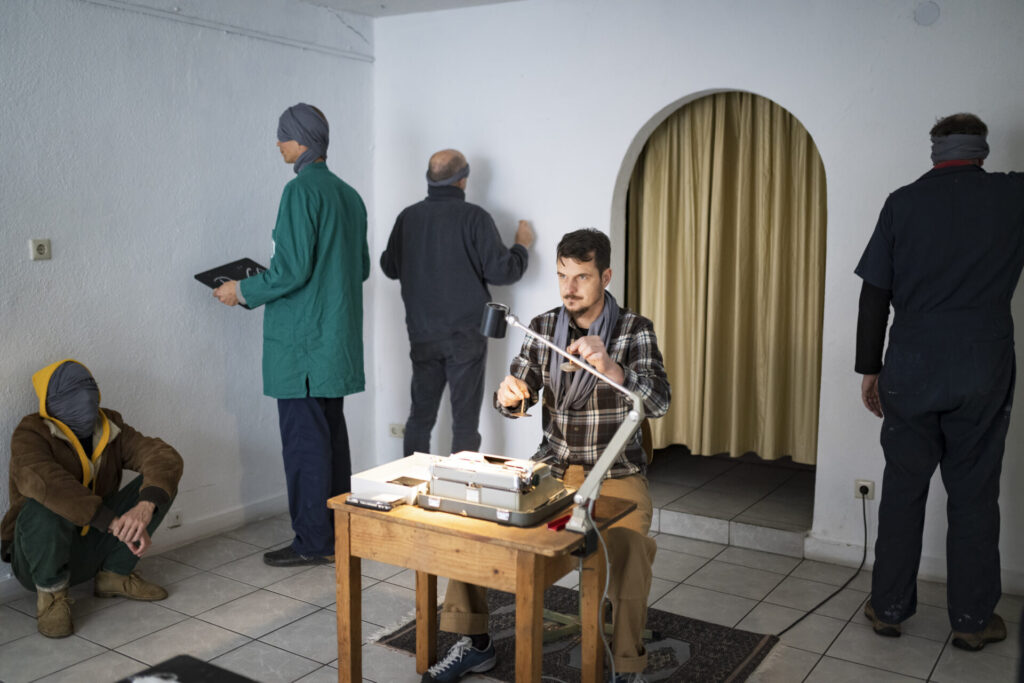
How do you see the relationship between sharing and participation?
Michael Roggon: I now think that participation is not a sure-fire success. Enabling it requires a caring framework and attentive nurturing. It needs a clear sense of purpose or simply needs to be sexy, irresistible and fun. Creating this framework is work. For us, utilisation is sometimes more, sometimes less self-directed and self-responsible. We board members are constantly faced with the following questions: Where do we need to relinquish control and where do we need it in order to avoid swimming aimlessly?
There are users who have not yet understood the participatory principle so well, who want to use the space according to market-economy logic and expect a service from the unpaid board of our organisation. We are working on communicating the participatory type of use more clearly. But with most of them it works like clockwork.
A final comment from the editors
1. Commoning practices trigger attention and provide unused but needed forms of social belonging.
2. Experimental public venues create variable spaces for different groups to come together.
3. Never be afraid to irritate, in a thoughtful and empathetic manner.
